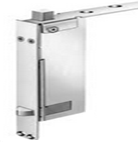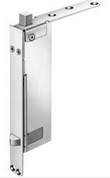- Installed in the top and/or bottom of an inactive door leaf
- Types include:
 |
 |
 |
| Manual | Automatic | Self-latching |
- Strike types include:
 |
 |
 |
| Handed (automatic or manual) |
Non-handed (automatic or manual) |
Lipped strike (e.g.: T-strike) (self-latching) |
Things to Consider:
Start with the manufacturer and model number, then pull the template from the manufacturer’s website.
- Are top & bottom flush bolts used?
- Are location centerlines 12” from the top and/or bottom?
- Typical mortised edge preps is ~ 6 3/4” x 1”.
- What type of astragal is being used (Z, flat, U Channel)?
What type of strike is required? (Note: there is no ANSI standard).
- Will a Non-Handed strike work? Is it OK with your customer?
- Are door pairs equal or unequal?
Red Flags:
These “red flags” will identify potential specification issues:
- Self-latching and automatic flush bolts can require special preps
- Doors over 7-0 tall often use extension rods usually purchased separately
- Quantity: 1 or 2? (Top only or top and bottom)
- FB’s vary based on wood or metal door. Wood door types are not for use on metal doors
